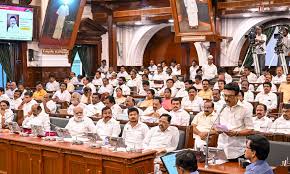Enabling legislation: on Tamil Nadu Bills, persons with disabilities.
Nomination of persons with disabilities to local bodies is a pioneering move.
Affirmative action remains one of the most effective ways of addressing historical wrongs and systemic deprivation. The most recent attempt to address deep-rooted discrimination against persons with disabilities in Tamil Nadu is likely to have a far-reaching impact for the community. Chief Minister M.K. Stalin tabled two Bills in the Assembly last week to increase the number of persons with disabilities in all local bodies in the State. While one Bill seeks to nominate persons with disabilities to all town panchayats, municipal councils and municipal corporations with amendments to the Tamil Nadu Urban Local Bodies Act, the second intends to bring into law the decision to nominate one person with disabilities to all village panchayats, panchayat union councils and district panchayats by amending the Tamil Nadu Panchayats Act. Mr. Stalin said once these Bills are enacted, there would be guaranteed posts for 650 persons with disabilities in urban local bodies, 12,913 in village panchayats, and 388 in panchayat unions, besides 37 persons with disabilities in district panchayats. At the moment, there are only 35 persons with disabilities in urban local bodies, he informed the House. Besides ensuring dignity for persons with disabilities, and eroding stigma and discrimination, this change would empower the community, involving their representatives in decision-making at the grassroots level.
It is the role of the government to take along its citizens, particularly those who may have an impediment that might come in the way of their harnessing equal opportunities as the rest of the population. After the 73rd and 74th amendments to the Constitution that allowed for one-third representation of all seats in panchayati raj institutions and urban local bodies to be reserved for women, some States, including Tamil Nadu, increased this to 50%. Since then, the very raucous and long-drawn-out battle was finally resolved in 2023, with the Women’s Reservation Act being passed for 33% reservation for women in the Lok Sabha and State Legislative Assemblies. This will be effective after the publication of the Census conducted following the Act’s commencement. Meanwhile, Tamil Nadu’s effort to appoint persons with disability is the first such effort in the country at bringing a marginalised community not merely into the mainstream but as leaders of society, thus raising their profile and larger acceptance, besides bringing change that will benefit the rest of the society. Given the initial experience of implementing women’s reservation in panchayati raj, where women panchayat leaders were de facto replaced by the husband in decision-making, it is important that the government ensures the benefit truly reaches the intended — in this case, persons with disabilities.
